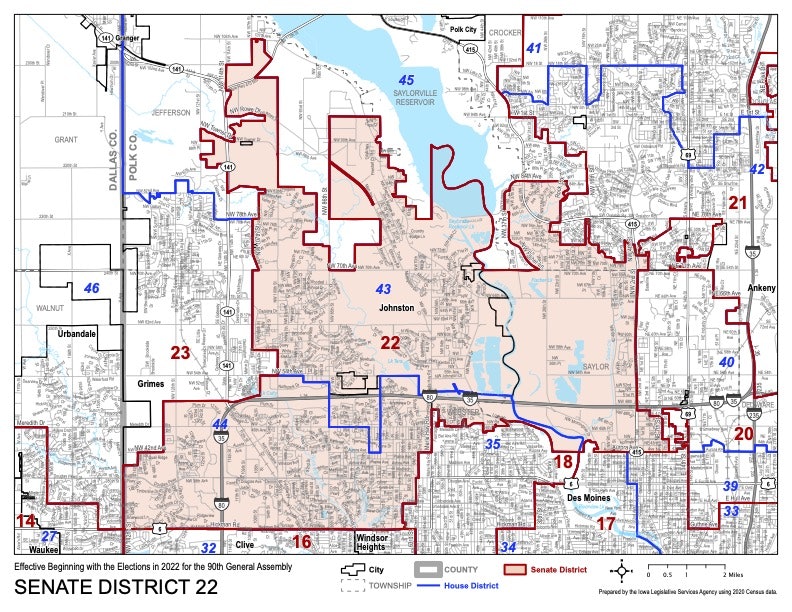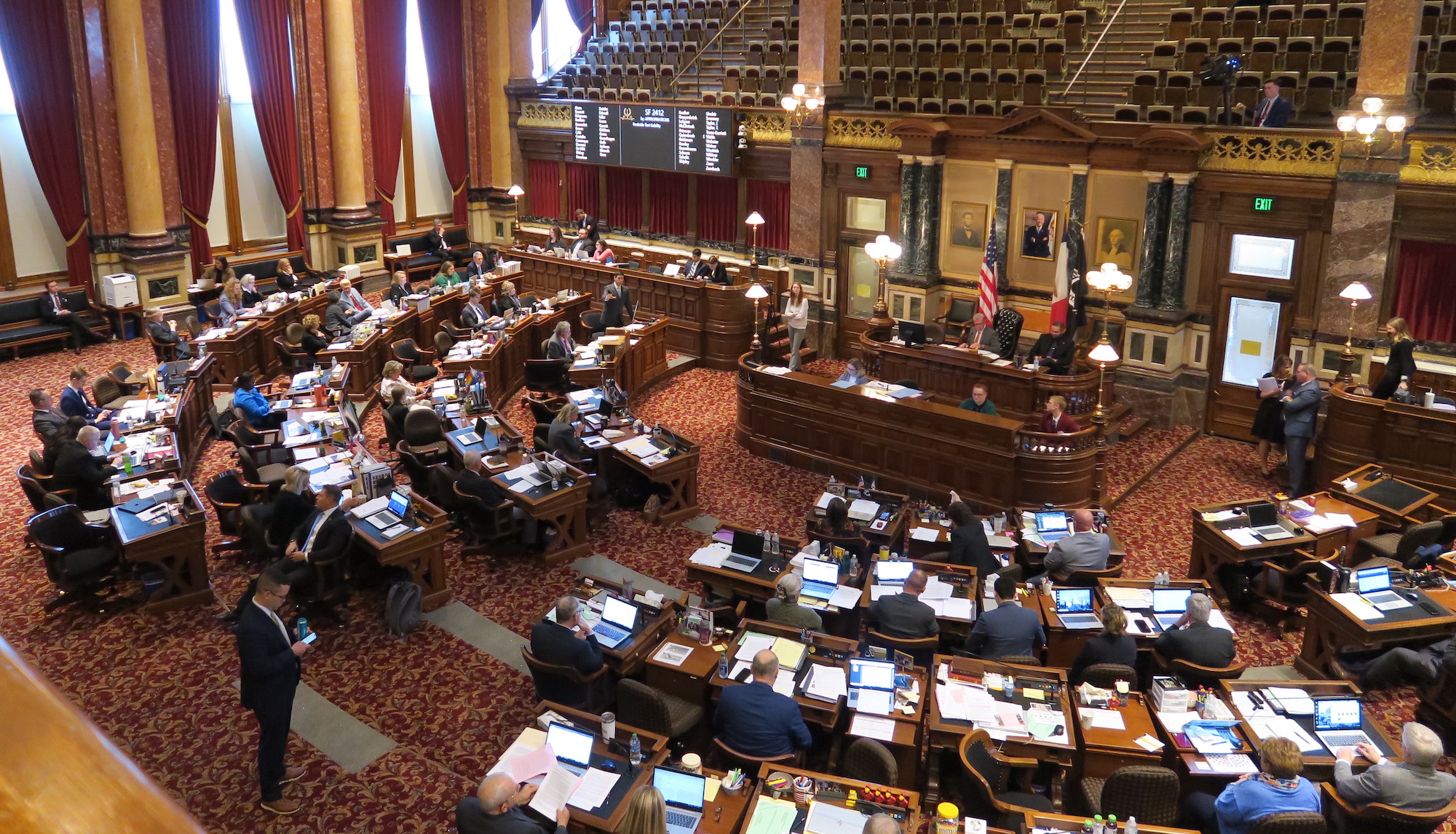Seventh in a series interpreting the results of Iowa’s 2024 state and federal elections.
Republicans will hold 35 of the 50 Iowa Senate seats when the legislature reconvenes in 2025, a net gain of one from the 34-16 GOP majority of the past two years. The results were finalized on November 22 and November 25 following recounts in two close races.
According to the legislature’s official website, the fifteen-member Democratic caucus will be the smallest contingent for the party in the Iowa Senate since the early 1960s. Maintaining a two-thirds majority means Republicans will be able to confirm Governor Kim Reynolds’ nominees without any Democratic support.
Redistricting played a role in all three districts where party control changed. The demise of ticket-splitting was also apparent, as three incumbents lost in areas where their constituents preferred the other party’s presidential nominee.
THREE INCUMBENTS LOSE WHERE VOTERS BACKED OTHER PARTY FOR PRESIDENT
Three sitting state senators were defeated in the November election. All faced headwinds from the top of the ticket.
State Senator Brad Zaun, the chamber’s longest-serving Republican, lost to Matt Blake in Senate district 22, covering some suburban areas northwest of Des Moines. The Democrat received 19,128 votes to 17,336 for Zaun (52.37 percent to 47.46 percent) after what may be the most expensive state Senate campaign in Iowa history.
Iowa’s suburban areas have become more blue over the past decade, and this race shows that trend continued. Zaun outperformed Donald Trump, however, as he had done in 2020. Bleeding Heartland’s analysis shows Kamala Harris received 19,687 votes for president (52.43 percent) in precincts that are part of Senate district 22. Trump received 17,156 votes (45.69 percent). The swing toward Trump in this district was much smaller than in other parts of Iowa. According to the map Josh Hughes created in Dave’s Redistricting App, Joe Biden received 53.2 percent of the 2020 presidential vote in precincts that are now part of Senate district 22, while Trump received 44.7 percent.
In Senate district 20, covering areas in eastern Polk County, Democratic State Senator Nate Boulton conceded on November 22 after a recount confirmed Republican challenger Mike Pike received 15,644 votes to 15,600 for Boulton (49.96 percent to 49.82 percent). Republicans spent around three-quarters of a million dollars on this race, and Democrats spent around half a million dollars defending Boulton’s seat.
These results reflect the consolidation of Republican gains in working-class areas. That said, Boulton was the strongest-performing Democratic candidate for Iowa Senate in a district that voted for Trump. Bleeding Heartland’s analysis of the precinct-level results show residents of Senate district 20 favored Trump by 16,905 votes to 15,440 for Harris (51.42 percent to 46.96 percent). That’s a big shift to the right compared to the 2020 voting across the same precincts (Biden 49.0 percent, Trump 48.7 percent).
Democratic State Senator Eric Giddens lost to Dave Sires in Senate district 38, covering parts of Black Hawk County and some precincts in Benton and Tama counties. This race was unusual in that the Republican Party of Iowa made no in-kind expenditures on behalf of the GOP nominee. Nevertheless, Sires received 17,232 votes to 16,846 for Giddens (50.51 percent to 49.38 percent).
Giddens outperformed the top of the Democratic ticket, though. Bleeding Heartland’s calculations show Trump carried Senate district 38 by 18,271 votes to 16,447 (51.72 percent to 46.56 percent). The 2020 presidential voting across the same precincts was much closer: Biden 49.1 percent, Trump 48.8 percent.
REDISTRICTING CONTRIBUTED TO INCUMBENT LOSSES
All three of the unsuccessful incumbents were competing on terrain less friendly to their party than the areas where they won previous elections.
The map adopted in 2021 left Republican-leaning Grimes and Jefferson township out of Zaun’s district. To make matters worse, he picked up some Des Moines precincts that favor Democrats. Here’s the old map where Zaun was re-elected in 2020, even as his district voted for Joe Biden.

And the new map where Blake defeated Zaun:

Boulton was even more unlucky with the new map. He won his first two races in 2016 and 2020 on turf that mostly contained heavily Democratic areas on the east side of Des Moines. Old district:

The new map left thousands of Des Moines households out of Boulton’s district, while adding the suburb of Altoona, Clay township, and even part of Ankeny. Biden and Trump had virtually tied in this area in 2020.

Finally, Giddens was first elected to the Senate in a 2019 special election and re-elected the following year in a district that contained parts of Waterloo as well as the cities of Cedar Falls and Hudson.

The map lawmakers adopted in 2021 removed most of the Waterloo households and extended Giddens’ district south to include more GOP-leaning areas of Black Hawk county as well as some precincts in Benton and Tama counties.

TWO CLOSE CALLS FOR DEMOCRATS
Republicans came very close to expanding their Iowa Senate majority to 37-13.
In Senate district 14, covering much of Dallas County, Democratic incumbent Sarah Trone Garriott held off a challenge from Republican Mark Hanson by 20,467 votes to 20,438 (49.96 percent to 49.89 percent) following a recount that wrapped up on November 25. Hanson was a much less polarizing figure than former Iowa Senate President Jake Chapman, whom Trone Garriott defeated in this district in 2022.
The parties combined to spend more than $1.5 million on this race. Trone Garriott’s tireless door knocking clearly paid off. By my calculations, she will be the only Democratic member of the Iowa Senate to represent a district that (barely) voted for Trump. He received 20,773 votes in the Senate district 14 precincts, to 20,626 votes for Harris (49.21 percent to 48.86 percent).
Tom Townsend kept Senate district 36, covering the city of Dubuque, in Democratic hands. That seat was open due to the retirement of longtime State Senator Pam Jochum. Townsend defeated Republican Nicholas Molo by 15,274 votes to 14,958 (50.45 percent to 49.41 percent).
Harris performed a little better here, outpolling Trump in the Senate district 36 precincts by 16,008 votes to 15,068 (50.63 percent to 47.67 percent).
LEADERS OF THE SENATE GOP AND DEMOCRATIC CAUCUSES
Shortly after the general election, Iowa Senate Republicans re-elected Jack Whitver as their majority leader and Amy Sinclair as Senate president (the second-ranking position). They chose Ken Rozenboom to replace Zaun as president pro-tem (the third-ranking role) and Mike Klimesh for majority whip. The previous whip, Waylon Brown, resigned from the legislature in July.
The four incoming Senate assistant majority leaders will be Carrie Koelker, Adrian Dickey, Lynn Evans, and Tim Kraayenbrink.
Jochum had led the Senate Democratic caucus since the summer of 2023. Since Jochum is leaving the legislature when her current term ends, Democrats voted last week to make first-term State Senator Janice Weiner the next minority leader.
State Senator Bill Dotzler will serve as the minority whip, the second-ranking Democratic position. The four assistant minority leaders will be Cindy Winckler, Molly Donahue, Claire Celsi, and Izaah Knox.


5 Comments
Districts held by party that lost presidential race
It may be too early to know the answer to this – but do we know if there are any House or Senate districts held by a party that lost the presidential race in that district? Thanks!
pbs60 Mon 25 Nov 11:05 PM
Update to prior question
Other than Trone Garriott, obviously.
pbs60 Tue 26 Nov 1:44 PM
pbs60
I have a post in progress about this. By my calculations Trone Garriott is the only state senator elected in a district that voted for the other party. There are five House Democrats and one House Republican who managed to do that. Stay tuned!
Laura Belin Tue 26 Nov 9:43 PM
Thanks!
Looking forward to it!
pbs60 Wed 27 Nov 2:24 PM
good article lack of coattails from top of ticket also a factor along with bogus poll
Good article. Also feel that Harris didn’t bring much in the line of “coattails” to local candidates in Iowa. That laughable Iowa Poll(Selzer) may have even driven turnout among Republicans. IDP can’t afford to lose anymore senate seats or we are looking at single digit representation. Need a full overhaul at the state party HQ to stop the insanity.
ModerateDem Fri 29 Nov 10:49 AM